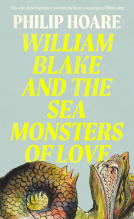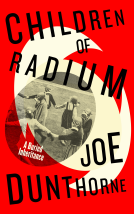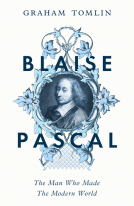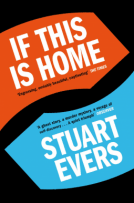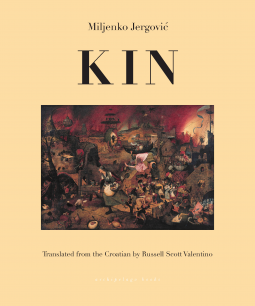
Kin
by Miljenko Jergovic
This title was previously available on NetGalley and is now archived.
Send NetGalley books directly to your Kindle or Kindle app
1
To read on a Kindle or Kindle app, please add kindle@netgalley.com as an approved email address to receive files in your Amazon account. Click here for step-by-step instructions.
2
Also find your Kindle email address within your Amazon account, and enter it here.
Pub Date 15 Jun 2021 | Archive Date 22 Apr 2021
Talking about this book? Use #Kin #NetGalley. More hashtag tips!
Description
Ordinary, forgotten objects - a grandfather's beekeeping journals, a rusty benzene lighter, an army issued raincoat - become the lenses through which Jergović investigates the joys and sorrows of a family living through a century of war. The work is ultimately an ode to Yugoslavia - Jergović sees his country through the devastation of the First World War, the Second, the Cold, then the Bosnian war of the 90s; through its changing street names and borders, shifting seasons, through its social rituals at graveyards, operas, weddings, markets - rendering it all in loving, vivid detail. A portrait of an era.
Advance Praise
"Vast, generous-spirited story of family across the face of the 20th century in the turbulent Balkans . . . There is beauty aplenty, and ample monstrosity, in Jergović’s account, as well as many moments of mystery: a beekeeper’s coded journal, the alpenglow that surrounds Sarajevo as surely as a besieging army, the “living torment” that is existence, all come under Jergović’s empathetic eye. A masterwork of modern European letters that should earn the author a wide readership outside his homeland."
-Kirkus Reviews (starred review)
"Miljenko Jergović has lived as a “foreigner” in Zagreb since 1993, where, as narrator, he channels stories of Sarajevo and the ways in which the city has embodied the 20th century’s major flash points—religious intolerance, virulent nationalism, and world wars . . . Jergović devotes the first section to quotidian ancestral history, but even here the scope widens with soaring chapters on the geopolitical changes after WWII . . . dozens of shimmering vignettes build to the hallucinatory novella-length capstone “Sarajevo Dogs” . . . [Jergović’s] astonishing project offers endless rewards." -Publishers Weekly (starred review)
Available Editions
| EDITION | Other Format |
| ISBN | 9781939810526 |
| PRICE | US$25.00 (USD) |
| PAGES | 500 |
Featured Reviews
 Mark Z, Reviewer
Mark Z, Reviewer
A moving Baltic Aeneid that tells a century-long story of a family’s struggle through wars and political chaos.
In true epic fashion, KIN begins in media res, in the middle of things, with a reference to a high school in Sarajevo that the narrator’s father and two uncles attended, the older uncle, Mladen, in 1934. At that time the city was a part of Yugoslavia, a synthetic nation created at the end of World War I, which disolved in 1992 after the Yugoslav Wars, when Sarajevo again became the capital city of the separate country of Bosnia and Herzegovina. Mladen is a central character in the century-long story in KIN, even though he lived only a short 19 years, killed during World War II as a German soldier. The time and location of the story are quickly set. It begins with Mladen’s grandfather, Karlo Stubler, a Swabian German from Banat, Romania, before the turn of the century. Karlo also lived in Serbia, Hungary, and Austria before settling in Dubrovnik, Croatia, only to be deported to Bosnia in 1920. And so began the saga of the extended Stubler family, complete with a changing cast of countries and languages until the story’s conclusion in Zagreb, Croatia in 2012.
The narrator of KIN observes in the early pages, “It is possible for language to determine a person’s destiny.” Karlo spoke German with his children, Croatian with his daughters’ husbands, and both those languages with his grandchildren, including the children of the narrator’s grandmother Olga, but only after they first address him in German. This was the environment in which Mladen grew up, and it was this family dynamic in 1942 that made him report for conscription in Hitler’s army rather than join the Partisans. Olga and her husband hated the fascists but decided that Mladen’s chances of survival were greater with the German army. They were tragically mistaken. Mladen was killed in 1943, the central event in KIN, around which the destinies of all family members would thereafter orbit, a tragic sphere of influence that would suck into its gravitational pull even the older ancestors from Romania, Croatia, Slovenia, and Austria. The narrator, Miljenko, widen the sphere to the younger generation when he moves to Zagreb at the beginning of the 1990’s Bosnian war. It is a return to the country from which his great grandfather was banished, but amid the geographic hatred of those times he remained to the Croatian artistic hierarchy a “Bosnian piece of shit.” In effect, the novel’s theme is one of nationalities, religions, and hatred, a contrast in some respects, but perhaps only a modern rendition of, Virgil’s “Of arms and the man I sing.”
KIN is a long book–500 pages–and its reading takes persistence and care. The events are not presented in a clear chronological order, and the author often takes leaps forward in the story and at times regresses to fill in family history, on occasion even repeating what has been said before. Jergovic’s story, being a family history, includes the author as a character, the youngest and last of the direct Karlo descendants, as it turns out. Miljenko is the story’s Aeneas. He recounts, almost relives, the hardships of the Stublers, particularly his mother, by wandering through their lives, in some places even giving the reader the impression that he is present in those decades before his birth. There are railway workers, doctors, beekeepers, pilots, book keepers, and even a match-stick juggler, more than fifty persons in all. And what the narrator doesn’t report, he imagines, in short digressions like the one about Sarajevo’s dogs. Unlike the Aeneid, the end of Miljenko’s story brings despair, not rage, although the two emotions for the Stublers are much alike. Javorka’s pain is Miljenko’s fault, just as Mladen’s death had been her fault. In the end Miljenko has made his story with concentric circles widening outward around his Opapa, Karlo Stubler, describing the people he “and his family knew well, of their fates in life, how their fates were entangled with his, and of the fates of all their offspring, up until the present day.” Yet, Miljenko cannot show mercy to his family. His mother’s death at the end of the story is for him almost a relief, as well as the end of the Stublers. They leave nothing behind for the city of Sarajevo, which, like Troy, was ravaged by war.
Mark Zvonkovic, Reviewer and Author
A sprawling, genre-defying work. Epic in scope, it combines memoir and fiction in a history of family and place from the late 19th century to (almost) the present day. The family is that of Karlo Stubler, the author’s great grandfather and the place is mainly Sarajevo and Bosnia with excursions to the Dalmatian coast in and around Dubrovnik. The author follows Karlo and his family through objects, photographs, encounters and across the city, its people and architecture over the course of Austro-Hungarian rule, the two world wars, socialism, the break-up of Yugoslavia, the civil war and its aftermath.
Some of the family stories are sketches, episodes while others, like The Bee Journal are novella-length. The Match Juggler relates the life story of a man the author’s great uncle encountered on a train journey for example, while Mama Ionesco: A Report and Sarajevo Dogs are meta/ autofiction where the author is writing the book being read.
Absorbing, immersive, melancholy and at times wondrous, Kin is a remarkable book. However, at around 900 pages, I also found it indulgent on occasion, a minor grumble in an otherwise highly recommended book. Excellent translation by Russell Scott Valentino too.
My thanks to Archipelago and Netgalley for the opportunity to read Kin.
